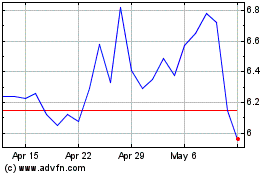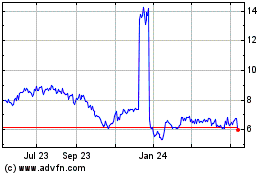By Heather Gillers and Nick Timiraos
The Puerto Rican government failed to pay almost half of $2
billion in bond payments due Friday, marking the commonwealth's
first-ever default on its constitutionally guaranteed debt.
Gov. Alejandro García Padilla defended the historic decision by
highlighting the island's tense relationship with Wall Street firms
that own its debt.
Some of these firms stand to lose money as a result of Friday's
nonpayment. Major insurers backing Puerto Rico's debt could also be
forced to pay out as much as hundreds of millions of dollars to
bondholders.
Puerto Rico had become over many years "a colony of Wall
Street," Mr. García Padilla told reporters in San Juan on Friday.
"We are starting the process of putting it back in the hands of
Puerto Ricans."
President Barack Obama signed legislation Thursday that
addressed the island's debt crisis but didn't provide any mechanism
to avoid Friday's default. Instead, the law gives the island a stay
against creditor litigation.
Of the $779 million in general obligation debt the commonwealth
failed to pay Friday, about half could translate into missed
payments for bondholders. The three major bond insurers active in
Puerto Rico are expected to cover as much as $358 million.
Puerto Rico's Government Development Bank also skipped payments
on some other bonds with weaker guarantees.
One creditor affected by Friday's actions is Eaton Vance
Management, which holds a few million dollars in general obligation
debt. But "for us it's a non-event," said Craig Brandon, Eaton
Vance's co-director of municipal investments, because the firm
expects to receive full principal and interest payments from
insurers.
Much of Puerto Rico's debt is held by hedge funds and municipal
bond mutual funds such as Oppenheimer Funds Inc. Oppenheimer's
total Puerto Rico debt has a face value of $7 billion, including
nearly $6 billion of uninsured bonds.
An Oppenheimer spokeswoman declined to comment on possible
losses, saying the firm looks forward "to working with all
stakeholders to help get Puerto Rico on a long-term sustainable
path while protecting the interests of our shareholders."
The municipal bond fund with the second-largest amount of Puerto
Rico debt is Franklin Templeton Inc., which holds $2.7 billion in
face value, most of it uninsured. A spokeswoman declined to
comment.
Municipal bond defaults are rare. The last time a state-level
issuer defaulted on general obligation debt was when Arkansas did
so in 1933.
The default was widely anticipated, and bond prices on Puerto
Rico debt remained largely unchanged Friday, with benchmark
uninsured general obligation bonds trading at 67.5 cents on the
dollar. In contrast, many insured general obligation bonds
continued to trade around 100 cents on the dollar.
News of the default was tempered by the passage of the
restructuring legislation. The law authorizes the creation of a
federally appointed fiscal control board in Puerto Rico, which
establishes a framework for a more orderly debt workout. The board
is tasked with restoring economic growth to the island and will
have considerable power to approve debt restructuring.
The restructuring legislation prevents creditors from asking a
court to force bond payments to be made ahead of essential
services. Without such a safeguard, the island's debt crisis would
have grown "much worse and might have been unsolvable," said
Treasury Secretary Jacob Lew on Wednesday.
Congress spent months working on the bipartisan bill that was
propelled through the Senate by concerns of a looming legal battle.
Voluntary talks with general obligation bondholders broke down in
recent weeks, and a group of hedge funds sued the island last week
over a local debt-moratorium law, saying the island was legally
required to pay them ahead of essential public services.
A separate group of hedge funds filed a motion Friday in a
lawsuit against Puerto Rico's governor, asking to be exempted from
the stay on lawsuits contained in the federal restructuring
legislation. The motion said the funds hold more than $750 million
in Government Development Bank debt, which Puerto Rico defaulted on
in May.
Three large bond insurers are bracing for payouts as a result of
Friday's events. National Public Finance Guarantee Corp. backs $173
million in general obligation debt that Puerto Rico was supposed to
pay Friday, the company has disclosed.
Assured Guaranty Ltd. has reported that it backs $184 million in
general obligation bond payments coming due in the third quarter of
2016, much of which was due Friday.
Ambac Financial Group backs only about $1 million in general
obligation debt due Friday, but Chief Executive Officer Nader
Tavakoli said in a televised appearance Friday that the bond
insurer expected to pay between $45 million and $50 million in
claims. Much of it will likely cover payments on the island's
Infrastructure Financing Authority debt, which Puerto Rico also
didn't make.
Mr. Tavakoli said in the interview that he hopes the fiscal
control board created under the restructuring legislation will
include "the right kinds of business people, growth-oriented
business people," who will focus on fiscal and structural reforms
for Puerto Rico, rather than on cutting payments to
bondholders.
Assured Guaranty said in a statement that it is well prepared to
handle defaults in Puerto Rico. "Our liquidity and capital position
are very strong," the statement said. National Public Finance
Guarantee, a unit of MBIA, declined to comment.
The island has been in a recession for most of the past decade
and has seen a large drop in its population as residents, who are
U.S. citizens, leave for the mainland.
Write to Heather Gillers at heather.gillers@wsj.com and Nick
Timiraos at nick.timiraos@wsj.com
(END) Dow Jones Newswires
July 01, 2016 18:57 ET (22:57 GMT)
Copyright (c) 2016 Dow Jones & Company, Inc.
MBIA (NYSE:MBI)
Historical Stock Chart
From Mar 2024 to Apr 2024

MBIA (NYSE:MBI)
Historical Stock Chart
From Apr 2023 to Apr 2024
